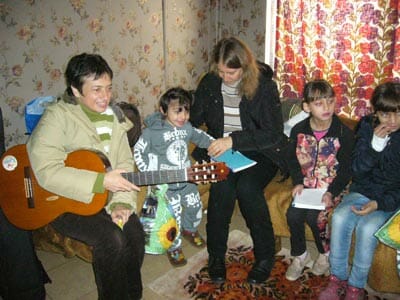
Jan 9, 2016 | Focolare Worldwide
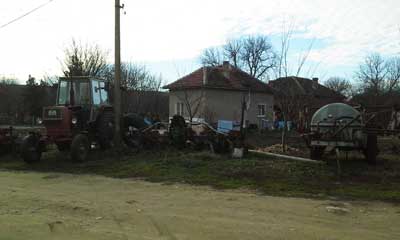 The members of the only Focolare Centre in Bulgaria, M. Lucia, Majda, Julia and Ildiko, from Italy, Slovenia, Germany and Romania, recounted: “Just before Christmas we went to Gostilya, a village to the north of Bulgaria, to visit friends who have been coming to the Mariapolis in Sofia over the last years. We wanted to show our gratitude and warmth by visiting them in their homes.” “We did not expect to find an almost deserted village,” they added. In fact, out of the 1,500 inhabitants at the start of the 1990s, the population now counts only about a hundred people due to the strong migratory phenomenon. There were about 20 young people. The school, nursery, library and other public facilities have been closed. The Catholic Church reopened three years ago, and the elderly deacon who was ordained lives the spirituality of unity.
The members of the only Focolare Centre in Bulgaria, M. Lucia, Majda, Julia and Ildiko, from Italy, Slovenia, Germany and Romania, recounted: “Just before Christmas we went to Gostilya, a village to the north of Bulgaria, to visit friends who have been coming to the Mariapolis in Sofia over the last years. We wanted to show our gratitude and warmth by visiting them in their homes.” “We did not expect to find an almost deserted village,” they added. In fact, out of the 1,500 inhabitants at the start of the 1990s, the population now counts only about a hundred people due to the strong migratory phenomenon. There were about 20 young people. The school, nursery, library and other public facilities have been closed. The Catholic Church reopened three years ago, and the elderly deacon who was ordained lives the spirituality of unity. 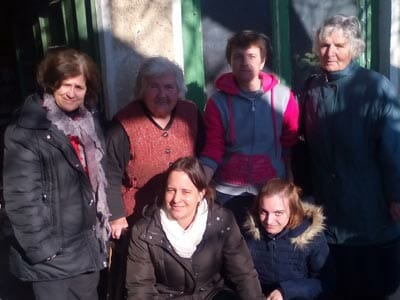 “We had prepared a bingo game with gifts for all and a chalk statue of Baby Jesus produced by children. We couldn’t imagine how much joy this would create: they were so grateful that someone had thought of going to visit them. A family that lived 30 km away also came and so did others who travelled three hours by car. The Mayor brought us on a “sightseeing” tour of the village.” “They vied with one another to give us something: a poor and sickly elderly lady who could not come to the meeting, baked sweet bread for breakfast. Before leaving, we dropped in on her to say thanks and give her a statue of Baby Jesus. She was moved, and listened to our Christmas carols at her doorstep. We also received a huge chicken for Christmas lunch, along with jars of honey and other preserved foods, which they specified to be “ecologically pure.”
“We had prepared a bingo game with gifts for all and a chalk statue of Baby Jesus produced by children. We couldn’t imagine how much joy this would create: they were so grateful that someone had thought of going to visit them. A family that lived 30 km away also came and so did others who travelled three hours by car. The Mayor brought us on a “sightseeing” tour of the village.” “They vied with one another to give us something: a poor and sickly elderly lady who could not come to the meeting, baked sweet bread for breakfast. Before leaving, we dropped in on her to say thanks and give her a statue of Baby Jesus. She was moved, and listened to our Christmas carols at her doorstep. We also received a huge chicken for Christmas lunch, along with jars of honey and other preserved foods, which they specified to be “ecologically pure.”  After Gostilya, we went to the extreme outskirts of the Bulgarian capital. In Sofia, on 24 December, the focolarine visited a Romani family with seven children, their friends for years now and who they try to help as much as possible. Majda had prepared them to receive the sacrament of Baptism, and another stood as godmother. To stress their love and esteem, the mother called the last child Majda, despite the fact that it is a Slovenian name and thus inexistent in Bulgaria. Julia, who instead works in a German school, spoke about this family to her colleagues who then donated clothes, foodstuffs and toys. “So we were able to prepare personalized gifts for each one – they said. A teacher asked them to take along her three children aged 8, 11 and 13 years, so they could see another reality, other than their own environment. Strengthened by such solidarity, we left for Botunetz, the name of the district where this family lives. We bought a small Christmas tree, so we could decorate it together. The mother had cleaned the house and dressed the children well, but there was so much humidity, cold and moulds. We passed a few hours with them, decorating the tree, singing Christmas carols, colouring drawings of the nativity scene, and unwrapping gifts. Everyone was happy and there was a real Christmas atmosphere. ” The same can be said of the traditional Christmas Mass in the jailhouse of Sofia, where a group of the Focolare Movement goes every year together with the Sisters of Charity of Mother Theresa, and for the festivities in a pensioners’ club. They said that this Christmas was one of sharing, in the name of joy, sobriety and solidarity. Maria Chiara De Lorenzo
After Gostilya, we went to the extreme outskirts of the Bulgarian capital. In Sofia, on 24 December, the focolarine visited a Romani family with seven children, their friends for years now and who they try to help as much as possible. Majda had prepared them to receive the sacrament of Baptism, and another stood as godmother. To stress their love and esteem, the mother called the last child Majda, despite the fact that it is a Slovenian name and thus inexistent in Bulgaria. Julia, who instead works in a German school, spoke about this family to her colleagues who then donated clothes, foodstuffs and toys. “So we were able to prepare personalized gifts for each one – they said. A teacher asked them to take along her three children aged 8, 11 and 13 years, so they could see another reality, other than their own environment. Strengthened by such solidarity, we left for Botunetz, the name of the district where this family lives. We bought a small Christmas tree, so we could decorate it together. The mother had cleaned the house and dressed the children well, but there was so much humidity, cold and moulds. We passed a few hours with them, decorating the tree, singing Christmas carols, colouring drawings of the nativity scene, and unwrapping gifts. Everyone was happy and there was a real Christmas atmosphere. ” The same can be said of the traditional Christmas Mass in the jailhouse of Sofia, where a group of the Focolare Movement goes every year together with the Sisters of Charity of Mother Theresa, and for the festivities in a pensioners’ club. They said that this Christmas was one of sharing, in the name of joy, sobriety and solidarity. Maria Chiara De Lorenzo
Jan 8, 2016 | Non categorizzato
The traditional date for the celebration of the Week of Prayer for Christian Unity in the northern hemisphere is from January 18th to 25th. In the southern hemisphere, where January is during the summer holidays, the churches celebrate the Week of Prayer on other dates, for example during the time of Pentecost. Here you can find the texts prepared by a mixed working group from Latvia, nominated by the Catholic Church and by the Ecumenical Council of Churches. The Christian churches invite all to “find opportunities throughout the year in which to express the level of communion already accomplished and to pray together for the full unity which is the desire of Christ himself,” according to Jesus’ prayer to the Father: “so that all may be one” (Jn 17). The Focolare Movement throughout the world is committed to fostering and supporting the various local events planned for the celebration of the week of prayer, through direct testimonies of ecumenical life among its members. The phrase chosen for the Week of Prayer 2016 also inspired the Word of Life for the month of January: “Called to proclaim the mighty acts of the Lord” (cfr 1 Pt 2:9).
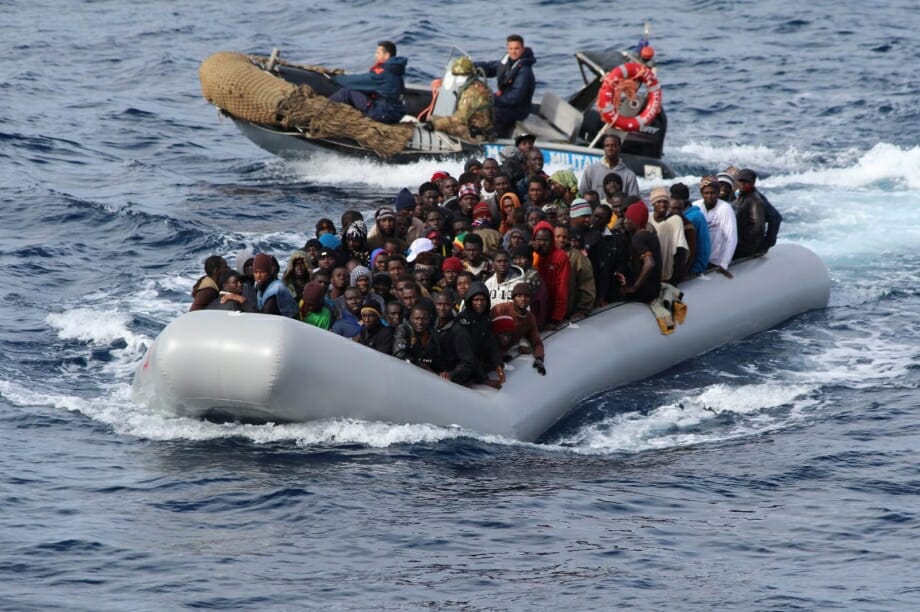
Jan 8, 2016 | Focolare Worldwide
 “Fifty exhausted young Africans arrived in our city. After many days at sea, the Italian flag came into sight. They had fled Lybia, some from the religious conflicts between Christians and Islamist fundamentalists, some from the overly exploited territories. They amassed on the seashores, beaten, robbed and constrained to take to the sea on crowded boats. After a stop at Lampedusa, they were spread out over several Italian towns. One of those towns was ours, Pomigliano d’Arco, in the Province of Naples. The oldest was thirty-six, and the youngest eighteen. We young people from San Felice Parish in Pincis ran out to visit them. They didn’t even know us, yet they welcomed us offering us places to sit, and they listened to our words. We had nothing to offer them other than our love. That meeting changed our life. The parish and the quarter adopted them. We got to work, many volunteers from different parish communities, but also many others who are doing as much as they can. The first thing to be done was to collect clothing. The children arrived shoeless and only with the clothes on their backs. We quickly began Italian lessons, organized cultural exchanges in view of gaining citizenship, while not overlooking their spiritual needs. We were very struck to see how the Catholics held on to their Bibles, robbed of everything else, they managed to salvage what they held most dear. They have much to teach us: when everything is lacking, faith in God can never be lacking. The Sunday liturgy, transformed into a trilingual Mass – with Italian, English and French – concluded amidst dance and applause to the rhythm of the bongos. Their singing and dancing not only conveyed their joy, but also made us live it with them as an image of the Resurrection. The Muslims received a visit from the Imam. Young people from Catholic Action organised a prayer vigil: blacks and whites, Catholics and Muslims, a tangible sign of peace amongst peoples and religions! One journalist from the area observed: “Anyone who follows their situation is inevitably overwhelmed by their honesty, values, neighbourliness, their dramatic stories that suddenly dampen even the most solid barrage of prejudice and transform ‘sterile’ solidarity for the needy into fraternal concern and loving closeness.” Such demonstrate show the contagious power of Love.” (Ilaria and Salvatore, Focolare Parish Movement, Pomigliano d’Arco, Italy) Source: Chiara Favotti: “Una buona notizia, gente che crede gente che muove” (Rome: Città Nuova).
“Fifty exhausted young Africans arrived in our city. After many days at sea, the Italian flag came into sight. They had fled Lybia, some from the religious conflicts between Christians and Islamist fundamentalists, some from the overly exploited territories. They amassed on the seashores, beaten, robbed and constrained to take to the sea on crowded boats. After a stop at Lampedusa, they were spread out over several Italian towns. One of those towns was ours, Pomigliano d’Arco, in the Province of Naples. The oldest was thirty-six, and the youngest eighteen. We young people from San Felice Parish in Pincis ran out to visit them. They didn’t even know us, yet they welcomed us offering us places to sit, and they listened to our words. We had nothing to offer them other than our love. That meeting changed our life. The parish and the quarter adopted them. We got to work, many volunteers from different parish communities, but also many others who are doing as much as they can. The first thing to be done was to collect clothing. The children arrived shoeless and only with the clothes on their backs. We quickly began Italian lessons, organized cultural exchanges in view of gaining citizenship, while not overlooking their spiritual needs. We were very struck to see how the Catholics held on to their Bibles, robbed of everything else, they managed to salvage what they held most dear. They have much to teach us: when everything is lacking, faith in God can never be lacking. The Sunday liturgy, transformed into a trilingual Mass – with Italian, English and French – concluded amidst dance and applause to the rhythm of the bongos. Their singing and dancing not only conveyed their joy, but also made us live it with them as an image of the Resurrection. The Muslims received a visit from the Imam. Young people from Catholic Action organised a prayer vigil: blacks and whites, Catholics and Muslims, a tangible sign of peace amongst peoples and religions! One journalist from the area observed: “Anyone who follows their situation is inevitably overwhelmed by their honesty, values, neighbourliness, their dramatic stories that suddenly dampen even the most solid barrage of prejudice and transform ‘sterile’ solidarity for the needy into fraternal concern and loving closeness.” Such demonstrate show the contagious power of Love.” (Ilaria and Salvatore, Focolare Parish Movement, Pomigliano d’Arco, Italy) Source: Chiara Favotti: “Una buona notizia, gente che crede gente che muove” (Rome: Città Nuova).
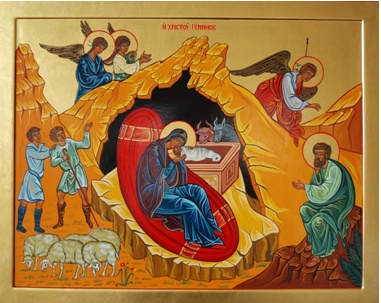
Jan 7, 2016 | Non categorizzato
 Salvator noster natus est! Our best wishes for a Holy Christmas to all the Christians celebrating the birth of the Saviour on 7 January. MERRY CHRISTMAS BUON NATALE РОЖДЕСТВО ХРИСТОВO ΚΑΛΆ ΧΡΙΣΤΟΎΓΕΝΝΑ عيد ميلاد سعيد!
Salvator noster natus est! Our best wishes for a Holy Christmas to all the Christians celebrating the birth of the Saviour on 7 January. MERRY CHRISTMAS BUON NATALE РОЖДЕСТВО ХРИСТОВO ΚΑΛΆ ΧΡΙΣΤΟΎΓΕΝΝΑ عيد ميلاد سعيد!

Jan 5, 2016 | Focolare Worldwide
 The star was not deceived when it called those distant ones to walk towards the God who was near to them. The star was not deceived when it showed the desert path, humbler and harder. The star was not deceived when it halted over the house of humble folk: there the great future was born. Your heart was not deceived when it took up the path in search of the unkown. Your heart was not deceived, when it did not give in to meaningless impatience. Your heart was not deceived, when it knelt before the Boy. Klaus Hemmerle: Dio Si È Fatto Bambino (Rome: Città Nuova, 2007) p.11.
The star was not deceived when it called those distant ones to walk towards the God who was near to them. The star was not deceived when it showed the desert path, humbler and harder. The star was not deceived when it halted over the house of humble folk: there the great future was born. Your heart was not deceived when it took up the path in search of the unkown. Your heart was not deceived, when it did not give in to meaningless impatience. Your heart was not deceived, when it knelt before the Boy. Klaus Hemmerle: Dio Si È Fatto Bambino (Rome: Città Nuova, 2007) p.11.
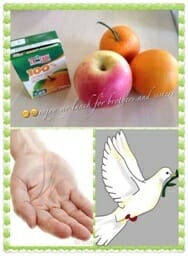
Jan 4, 2016 | Focolare Worldwide, Senza categoria
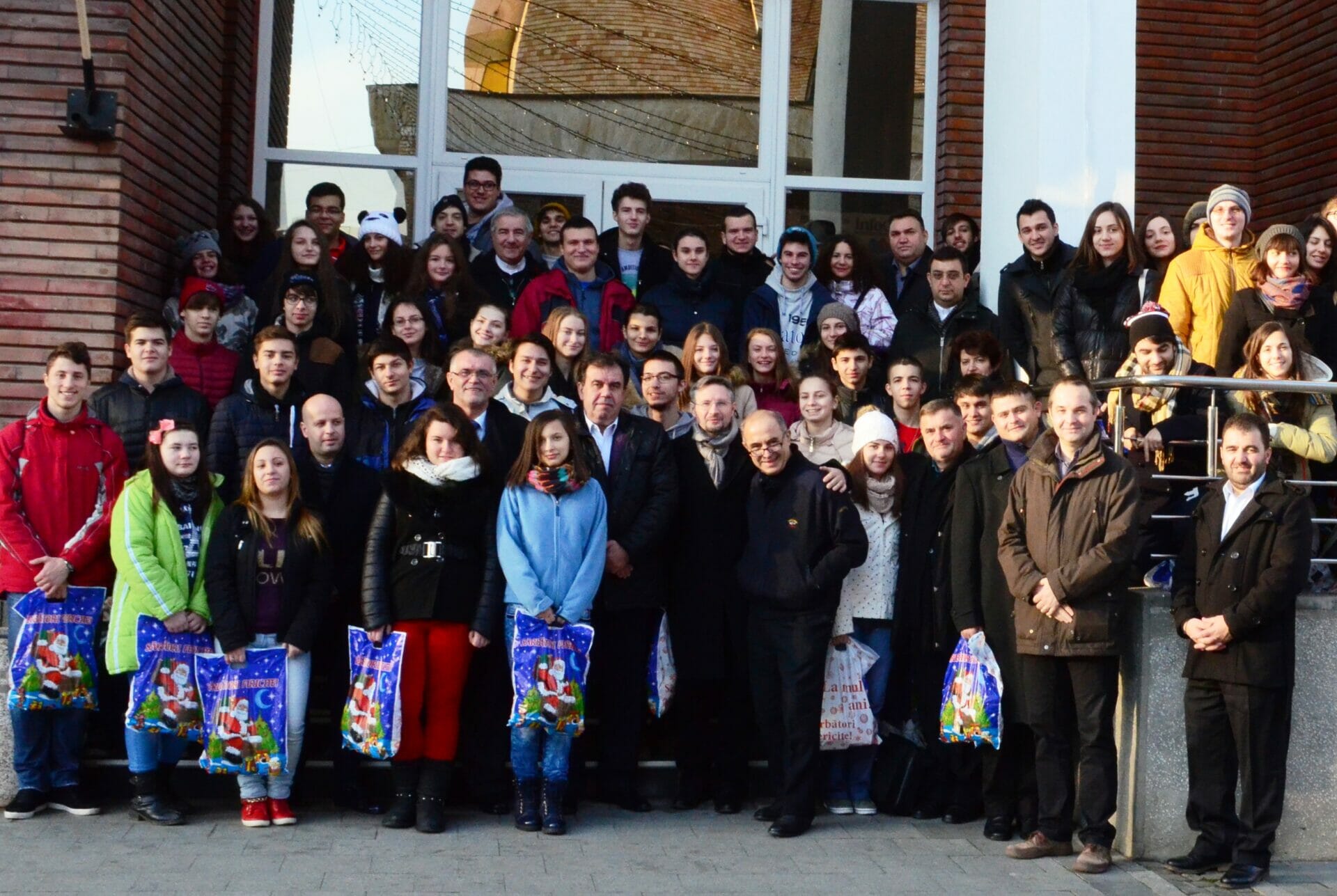 There is a festive atmosphere in Reșița, Romania, a Municipality located on the border with Serbia, population around 90,000. The first young people began to arrive yesterday evening from Italy, Catholic youth who were welcomed at an official ceremony in the most ancient Orthodox church in the city, and they were offered hospitality in the homes of their Romanian peers. Today the Orthodox youth arrive: some by bus, some by car and some on foot. The Municipal Administration held a moment of greeting before the party moved on to Băile Herculane, a tourist town in the southwest of the country where an ecumenical camp will be held. The vice-mayor was pleased and expressed congratulations for the experience of twinning between the Romanian Parish of Our Lady of the Assumption and the Roman Catholic parish of Santa Maria de Borgo in Pesaro, Italy, which has been established for eight years. This was followed by presentations with Italian and Romanian young people. The dominant feeling was certainly the joy of discovering one another as brothers and sisters united in the same Christian faith. This common bond was even more invigorated by their shared goal of building a more united world, and of deepening their own unity through a genuine and sincere exchange during their days at the camp. They are not only Catholics. Gabor, for example, is a Calvinist and others are Evangelicals. But here there are only Christians, accompanied by the wise and caring guides from their parishes. The choice of Resita was not a random one. It is located in the region of Banat that has had a decades-long calling to tolerance and openness. Eighteen different ethnicities live there and belong to several different Christian Churches. Anna attended becuase she believes in the unity amongst Christians and wants to make her own contribution so that it happens as soon as possible. Joseph studies medicine, but at the end of Medical school he wants to pursue the priesthood. Emil wants to be a film director. Matteo does not know what he will study or do in life. He only knows that he wants to be part of this project of building unity at every level. They do not know what the future will be, but they believe in their common ideal. Days of sharing and deep friendship await them based on the same love that each of them has for Jesus and for “his dream” that all be one.
There is a festive atmosphere in Reșița, Romania, a Municipality located on the border with Serbia, population around 90,000. The first young people began to arrive yesterday evening from Italy, Catholic youth who were welcomed at an official ceremony in the most ancient Orthodox church in the city, and they were offered hospitality in the homes of their Romanian peers. Today the Orthodox youth arrive: some by bus, some by car and some on foot. The Municipal Administration held a moment of greeting before the party moved on to Băile Herculane, a tourist town in the southwest of the country where an ecumenical camp will be held. The vice-mayor was pleased and expressed congratulations for the experience of twinning between the Romanian Parish of Our Lady of the Assumption and the Roman Catholic parish of Santa Maria de Borgo in Pesaro, Italy, which has been established for eight years. This was followed by presentations with Italian and Romanian young people. The dominant feeling was certainly the joy of discovering one another as brothers and sisters united in the same Christian faith. This common bond was even more invigorated by their shared goal of building a more united world, and of deepening their own unity through a genuine and sincere exchange during their days at the camp. They are not only Catholics. Gabor, for example, is a Calvinist and others are Evangelicals. But here there are only Christians, accompanied by the wise and caring guides from their parishes. The choice of Resita was not a random one. It is located in the region of Banat that has had a decades-long calling to tolerance and openness. Eighteen different ethnicities live there and belong to several different Christian Churches. Anna attended becuase she believes in the unity amongst Christians and wants to make her own contribution so that it happens as soon as possible. Joseph studies medicine, but at the end of Medical school he wants to pursue the priesthood. Emil wants to be a film director. Matteo does not know what he will study or do in life. He only knows that he wants to be part of this project of building unity at every level. They do not know what the future will be, but they believe in their common ideal. Days of sharing and deep friendship await them based on the same love that each of them has for Jesus and for “his dream” that all be one.  In China the project is focused on peace and fraternity. There, the trailblazers are also young people, but they intend to involve people of all ages. Their proposal: Give up a meal, a snack or something else on the 11th day of each month from November until April. Give the money that was saved to the poor. The money can be sent via “red pocket” on the social network. To help remember they have supplied bus identity cards with card-holders stamped with the Youth for a United World logo and six thumbs-up to be coloured every time you participate in the the project. To their great surprise, a large number of “red pockets” arrived in just a few short hours accompanied by messages of gratitude and encouragement. It was like a grapevine that spread peace, generosity and commitment. Up until now 844 euros have been collected, a small amount, but rich in meaning with the messages that accompanied the donations. In China, Novemeber 11th was a day dedicated to the unmarried and to shopping. Some gave up a snack, others a more substantial meal. One girl wrote: “I didn’t find anything to buy, because everything was very expensive. Then, I was glad to hear about your project and I’m pleased to offer this small contribution for someone in need.” Gustavo Clariá
In China the project is focused on peace and fraternity. There, the trailblazers are also young people, but they intend to involve people of all ages. Their proposal: Give up a meal, a snack or something else on the 11th day of each month from November until April. Give the money that was saved to the poor. The money can be sent via “red pocket” on the social network. To help remember they have supplied bus identity cards with card-holders stamped with the Youth for a United World logo and six thumbs-up to be coloured every time you participate in the the project. To their great surprise, a large number of “red pockets” arrived in just a few short hours accompanied by messages of gratitude and encouragement. It was like a grapevine that spread peace, generosity and commitment. Up until now 844 euros have been collected, a small amount, but rich in meaning with the messages that accompanied the donations. In China, Novemeber 11th was a day dedicated to the unmarried and to shopping. Some gave up a snack, others a more substantial meal. One girl wrote: “I didn’t find anything to buy, because everything was very expensive. Then, I was glad to hear about your project and I’m pleased to offer this small contribution for someone in need.” Gustavo Clariá
Jan 3, 2016 | Non categorizzato
https://vimeo.com/148206157
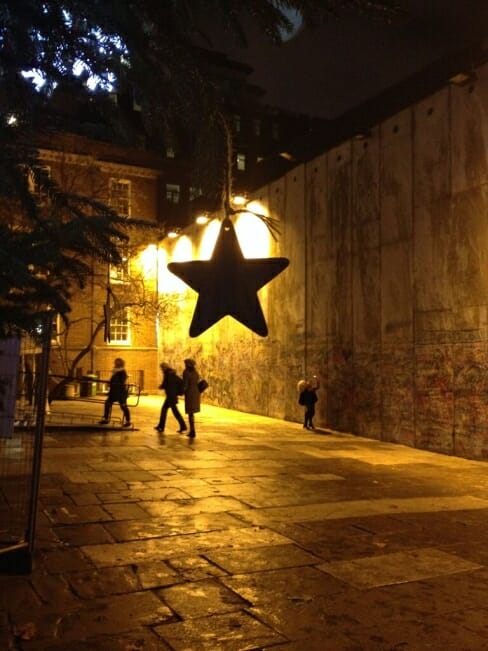
Jan 1, 2016 | Focolare Worldwide
 The message of Pope Francis in this Jubilee Year of Mercy urges us more than ever to live the immense gift of Peace. It is a strong plea that shakes our conscience and invites us to convert ourselves. Peace and Mercy: two inseparable elements for coexistence among people and with all Creation, and two words which we have become more aware of today, now that they are absent. A piece of the papal message brought me back to my homeland. It is really moving for me – an Arab-Catholic of Palestinian origin – to study Jesus’ behaviour following the motto, “Overcome indifference and achieve Peace.” In retracing those places, I can affirm that He lived as a Person and narrated divine parables taken from daily life. Sad to say, still today in my homeland, Peace is still not fully known, even if it is where the three great monotheistic religions were founded. Eight million people live in the State of Israel and four million in the Palestinian Territories. In these two localities the Christians make up 2% of the population, and belong to various churches: the Catholic, Orthodox, Armenian, Syriac-Orthodox, Coptic, Lutheran and other churches. It is a tiny land but a vast one for its multi-religious, multi-cultural and multi-confessional dimensions, and one that suffered many invasions, conquests and conflicts that still continue today. The possibility for peaceful coexistence is still a path to be traced, even if here and there, efforts have been made to find a just and enduring political solution. Fear and mutual distrust have raised walls of division between one and the other part of the population, and above all, hostility and diffidence in the hearts of people, which are difficult to demolish. The Pope’s words struck me deeply: “At individual and community level, indifference towards one’s neighbour results from indifference towards God, and assumes the aspect of inertia and non-commitment, that nurtures the prolonging of situations of injustice and serious social imbalance, which in turn may lead to conflicts or, in every case, generate a climate of dissatisfaction that risks turning into violence and insecurity, sooner or later.” In the years I have lived in Jerusalem, together with many others I tried to diffuse the spirit of true and sincere dialogue between the Arabs and Jews, through friendship and affection which only human relationships can instate. In fact, it is not so effective to speak of peace, only in a political sense, if we do not first build relationships with people. Our efforts gave rise to moments of encounter between the youth and families, protagonists of the two parties that effected concrete actions of pacification, solidarity, and mutual respect. “Overcome indifference and achieve Peace” is a message that brings new hope to our hearts. The Pope admonishes by saying: “Some prefer not to seek peace or information, and live in their wellbeing and comfort, turning a deaf ear to humanity’s cry of pain. We have become almost unaware of and unable to feel compassion for others and their dramatic lives. We do not care about them, as if what is happening to them is not our responsibility.” Pope Francis’s message gives us a new impulse towards real change. May 2016 see us all firmly and assuredly involved at various levels, in creating justice and working for peace which is a gift of God, entrusted to all men and women of the world. It is up to each of us to achieve this goal.
The message of Pope Francis in this Jubilee Year of Mercy urges us more than ever to live the immense gift of Peace. It is a strong plea that shakes our conscience and invites us to convert ourselves. Peace and Mercy: two inseparable elements for coexistence among people and with all Creation, and two words which we have become more aware of today, now that they are absent. A piece of the papal message brought me back to my homeland. It is really moving for me – an Arab-Catholic of Palestinian origin – to study Jesus’ behaviour following the motto, “Overcome indifference and achieve Peace.” In retracing those places, I can affirm that He lived as a Person and narrated divine parables taken from daily life. Sad to say, still today in my homeland, Peace is still not fully known, even if it is where the three great monotheistic religions were founded. Eight million people live in the State of Israel and four million in the Palestinian Territories. In these two localities the Christians make up 2% of the population, and belong to various churches: the Catholic, Orthodox, Armenian, Syriac-Orthodox, Coptic, Lutheran and other churches. It is a tiny land but a vast one for its multi-religious, multi-cultural and multi-confessional dimensions, and one that suffered many invasions, conquests and conflicts that still continue today. The possibility for peaceful coexistence is still a path to be traced, even if here and there, efforts have been made to find a just and enduring political solution. Fear and mutual distrust have raised walls of division between one and the other part of the population, and above all, hostility and diffidence in the hearts of people, which are difficult to demolish. The Pope’s words struck me deeply: “At individual and community level, indifference towards one’s neighbour results from indifference towards God, and assumes the aspect of inertia and non-commitment, that nurtures the prolonging of situations of injustice and serious social imbalance, which in turn may lead to conflicts or, in every case, generate a climate of dissatisfaction that risks turning into violence and insecurity, sooner or later.” In the years I have lived in Jerusalem, together with many others I tried to diffuse the spirit of true and sincere dialogue between the Arabs and Jews, through friendship and affection which only human relationships can instate. In fact, it is not so effective to speak of peace, only in a political sense, if we do not first build relationships with people. Our efforts gave rise to moments of encounter between the youth and families, protagonists of the two parties that effected concrete actions of pacification, solidarity, and mutual respect. “Overcome indifference and achieve Peace” is a message that brings new hope to our hearts. The Pope admonishes by saying: “Some prefer not to seek peace or information, and live in their wellbeing and comfort, turning a deaf ear to humanity’s cry of pain. We have become almost unaware of and unable to feel compassion for others and their dramatic lives. We do not care about them, as if what is happening to them is not our responsibility.” Pope Francis’s message gives us a new impulse towards real change. May 2016 see us all firmly and assuredly involved at various levels, in creating justice and working for peace which is a gift of God, entrusted to all men and women of the world. It is up to each of us to achieve this goal.
Dec 31, 2015 | Focolare Worldwide
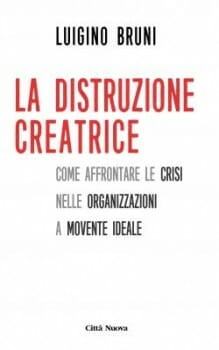
Dec 30, 2015 | Non categorizzato
 In his introduction to Bruni’s new book entitled, “Creative Destruction,” Marco Tarquinio, Director of the Catholic newspaper wrote: «Bruni was well aware that this line of thought would lead him to the confines separating the human and the inhuman and regrettably, also beyond, to the complex organisations prevalently driven by material objectives. He perfectly knew that in writing about these issues, i.e., about “production” and “marketing” organisations and thus, of the creativity of relationships and employment, he would eventually have to focus on the organisations driven by ideals and other aspirations of the human spirit,» bringing both fields «to face the same challenge of renewal without losing their roots and driving spirit.» Published by New City Press, the book is a collection of selected articles published in 2015 on Avvenire, taken from the series, “The midwives of Egypt,” and “Regenerations.” In the book’s last chapter entitled, “The periphery is where we learn to resurrect,” Bruni comes to the conclusion of his work and the challenges resulting from his reflection which took him some months to delineate. He introduces his proposals with a phrase of the German poet, Friedrich Hölderlin: “God created man the way the sea created the continents: through withdrawal.” Here are some passages which in a way introduce us to the book proper: «A movement that with time has turned into an organisation can undergo a charismatic renewal, if in some marginal zone of the “Kingdom” some creative minorities start reconstituting the conditions needed to revive the same miracle of the charism’s first foundation: the same enthusiasm, joy, and the same fruits. The true process that brings this very same minority to become the majority is called reform. […] It is a decisive process that has to be undertaken unhurriedly, and should involve and activate the dynamic settings of creativity, going out to them “at the confines of the empire.” All this is certainly and firstly, a gift (charis), but also signifies wise organisation, and deep, spiritual, prophetic, and transformative intelligence. […] Many new “evangelisations” come about upon recounting the good news, and we are able to feel it come alive in us, in a new and diverse manner. This is how a new-ancient love story is reborn – a new eros, new desires, new generativity, and new children. […] The charism may thus flourish again and resume its encounter with people in the streets, forgetting its own organisations so as to tend to the wounds and sufferings of the men and woman today, especially of the poorer ones, […] creatively interpreting their own mission in the present time.»
In his introduction to Bruni’s new book entitled, “Creative Destruction,” Marco Tarquinio, Director of the Catholic newspaper wrote: «Bruni was well aware that this line of thought would lead him to the confines separating the human and the inhuman and regrettably, also beyond, to the complex organisations prevalently driven by material objectives. He perfectly knew that in writing about these issues, i.e., about “production” and “marketing” organisations and thus, of the creativity of relationships and employment, he would eventually have to focus on the organisations driven by ideals and other aspirations of the human spirit,» bringing both fields «to face the same challenge of renewal without losing their roots and driving spirit.» Published by New City Press, the book is a collection of selected articles published in 2015 on Avvenire, taken from the series, “The midwives of Egypt,” and “Regenerations.” In the book’s last chapter entitled, “The periphery is where we learn to resurrect,” Bruni comes to the conclusion of his work and the challenges resulting from his reflection which took him some months to delineate. He introduces his proposals with a phrase of the German poet, Friedrich Hölderlin: “God created man the way the sea created the continents: through withdrawal.” Here are some passages which in a way introduce us to the book proper: «A movement that with time has turned into an organisation can undergo a charismatic renewal, if in some marginal zone of the “Kingdom” some creative minorities start reconstituting the conditions needed to revive the same miracle of the charism’s first foundation: the same enthusiasm, joy, and the same fruits. The true process that brings this very same minority to become the majority is called reform. […] It is a decisive process that has to be undertaken unhurriedly, and should involve and activate the dynamic settings of creativity, going out to them “at the confines of the empire.” All this is certainly and firstly, a gift (charis), but also signifies wise organisation, and deep, spiritual, prophetic, and transformative intelligence. […] Many new “evangelisations” come about upon recounting the good news, and we are able to feel it come alive in us, in a new and diverse manner. This is how a new-ancient love story is reborn – a new eros, new desires, new generativity, and new children. […] The charism may thus flourish again and resume its encounter with people in the streets, forgetting its own organisations so as to tend to the wounds and sufferings of the men and woman today, especially of the poorer ones, […] creatively interpreting their own mission in the present time.»

 The members of the only Focolare Centre in Bulgaria, M. Lucia, Majda, Julia and Ildiko, from Italy, Slovenia, Germany and Romania, recounted: “Just before Christmas we went to Gostilya, a village to the north of Bulgaria, to visit friends who have been coming to the Mariapolis in Sofia over the last years. We wanted to show our gratitude and warmth by visiting them in their homes.” “We did not expect to find an almost deserted village,” they added. In fact, out of the 1,500 inhabitants at the start of the 1990s, the population now counts only about a hundred people due to the strong migratory phenomenon. There were about 20 young people. The school, nursery, library and other public facilities have been closed. The Catholic Church reopened three years ago, and the elderly deacon who was ordained lives the spirituality of unity.
The members of the only Focolare Centre in Bulgaria, M. Lucia, Majda, Julia and Ildiko, from Italy, Slovenia, Germany and Romania, recounted: “Just before Christmas we went to Gostilya, a village to the north of Bulgaria, to visit friends who have been coming to the Mariapolis in Sofia over the last years. We wanted to show our gratitude and warmth by visiting them in their homes.” “We did not expect to find an almost deserted village,” they added. In fact, out of the 1,500 inhabitants at the start of the 1990s, the population now counts only about a hundred people due to the strong migratory phenomenon. There were about 20 young people. The school, nursery, library and other public facilities have been closed. The Catholic Church reopened three years ago, and the elderly deacon who was ordained lives the spirituality of unity.  “We had prepared a bingo game with gifts for all and a chalk statue of Baby Jesus produced by children. We couldn’t imagine how much joy this would create: they were so grateful that someone had thought of going to visit them. A family that lived 30 km away also came and so did others who travelled three hours by car. The Mayor brought us on a “sightseeing” tour of the village.” “They vied with one another to give us something: a poor and sickly elderly lady who could not come to the meeting, baked sweet bread for breakfast. Before leaving, we dropped in on her to say thanks and give her a statue of Baby Jesus. She was moved, and listened to our Christmas carols at her doorstep. We also received a huge chicken for Christmas lunch, along with jars of honey and other preserved foods, which they specified to be “ecologically pure.”
“We had prepared a bingo game with gifts for all and a chalk statue of Baby Jesus produced by children. We couldn’t imagine how much joy this would create: they were so grateful that someone had thought of going to visit them. A family that lived 30 km away also came and so did others who travelled three hours by car. The Mayor brought us on a “sightseeing” tour of the village.” “They vied with one another to give us something: a poor and sickly elderly lady who could not come to the meeting, baked sweet bread for breakfast. Before leaving, we dropped in on her to say thanks and give her a statue of Baby Jesus. She was moved, and listened to our Christmas carols at her doorstep. We also received a huge chicken for Christmas lunch, along with jars of honey and other preserved foods, which they specified to be “ecologically pure.”  After Gostilya, we went to the extreme outskirts of the Bulgarian capital. In Sofia, on 24 December, the focolarine visited a Romani family with seven children, their friends for years now and who they try to help as much as possible. Majda had prepared them to receive the sacrament of Baptism, and another stood as godmother. To stress their love and esteem, the mother called the last child Majda, despite the fact that it is a Slovenian name and thus inexistent in Bulgaria. Julia, who instead works in a German school, spoke about this family to her colleagues who then donated clothes, foodstuffs and toys. “So we were able to prepare personalized gifts for each one – they said. A teacher asked them to take along her three children aged 8, 11 and 13 years, so they could see another reality, other than their own environment. Strengthened by such solidarity, we left for Botunetz, the name of the district where this family lives. We bought a small Christmas tree, so we could decorate it together. The mother had cleaned the house and dressed the children well, but there was so much humidity, cold and moulds. We passed a few hours with them, decorating the tree, singing Christmas carols, colouring drawings of the nativity scene, and unwrapping gifts. Everyone was happy and there was a real Christmas atmosphere. ” The same can be said of the traditional Christmas Mass in the jailhouse of Sofia, where a group of the Focolare Movement goes every year together with the Sisters of Charity of Mother Theresa, and for the festivities in a pensioners’ club. They said that this Christmas was one of sharing, in the name of joy, sobriety and solidarity. Maria Chiara De Lorenzo
After Gostilya, we went to the extreme outskirts of the Bulgarian capital. In Sofia, on 24 December, the focolarine visited a Romani family with seven children, their friends for years now and who they try to help as much as possible. Majda had prepared them to receive the sacrament of Baptism, and another stood as godmother. To stress their love and esteem, the mother called the last child Majda, despite the fact that it is a Slovenian name and thus inexistent in Bulgaria. Julia, who instead works in a German school, spoke about this family to her colleagues who then donated clothes, foodstuffs and toys. “So we were able to prepare personalized gifts for each one – they said. A teacher asked them to take along her three children aged 8, 11 and 13 years, so they could see another reality, other than their own environment. Strengthened by such solidarity, we left for Botunetz, the name of the district where this family lives. We bought a small Christmas tree, so we could decorate it together. The mother had cleaned the house and dressed the children well, but there was so much humidity, cold and moulds. We passed a few hours with them, decorating the tree, singing Christmas carols, colouring drawings of the nativity scene, and unwrapping gifts. Everyone was happy and there was a real Christmas atmosphere. ” The same can be said of the traditional Christmas Mass in the jailhouse of Sofia, where a group of the Focolare Movement goes every year together with the Sisters of Charity of Mother Theresa, and for the festivities in a pensioners’ club. They said that this Christmas was one of sharing, in the name of joy, sobriety and solidarity. Maria Chiara De Lorenzo 






